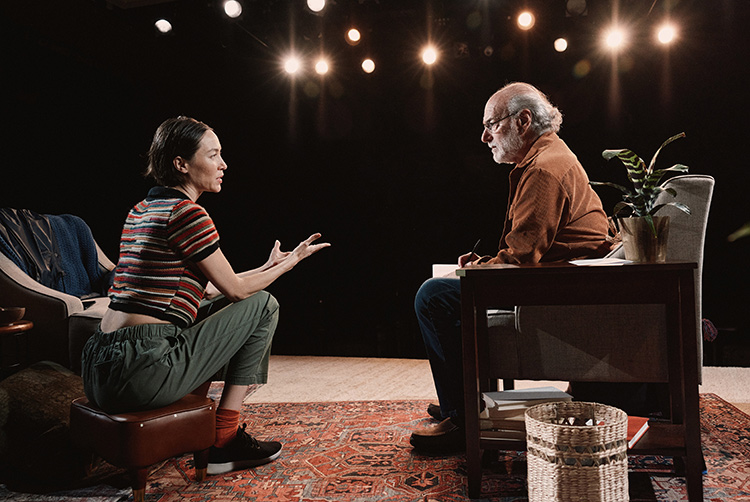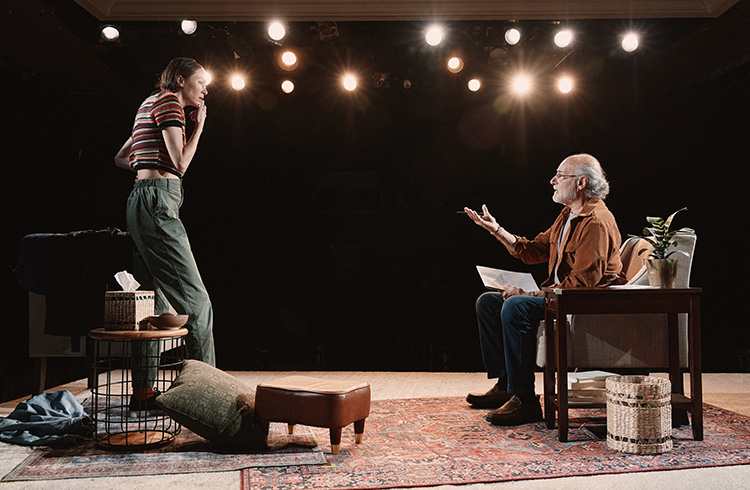ENTER YOUR EMAIL TO RECEIVE OUR WEEKLY NEWSLETTER
Job at Alphabet City’s Connelly Theater: An Ecstatic Review
Spellbinding. Nothing short of phenomenal. So says our reviewer, George Blecher, of this 80-minute two-hander that starts out as a melodrama and ends as an investigation of some of the most perplexing social questions of our time
By George Blecher

Session in progress: Sydney Lemmon and Peter Friedman as patient and psychotherapist in Job. Photos by Emilio Madrid.
. . . . . . . . . . . . .
Updated March 14, 2024
I am in total awe of this play.
Job—at the Connelly Theater in Lower Manhattan; please hurry to see it before it ends March 23rd!—is nothing short of phenomenal. But it is not terribly easy to say why.
At its most obvious level, Job—not the biblical character but the synonym for “occupation”—is a short, mostly realistic dialogue using the overly familiar trope of a psychological evaluation of a distraught, most likely disturbed young woman by a gentle, humane psychotherapist. Not the most promising material for a wholly original, sweepingly ambitious investigation of everything from the gap between Baby Boomers and Millennials, porn and sadism on the internet, power relationships between therapist and patient, the emotional price of caring for and about other people—and the nature of evil. Quite a lot of ground to cover in 80 minutes!
But from its first second, Job is spellbinding. I think I heard three coughs and a sneeze during the whole performance. At the end, most of the audience seemed so stunned that they neglected to offer the usual standing ovation and stayed glued to their seats, equally exhausted and exhilarated.
The backstory of Job isn’t hard to recount. A 30-ish “content moderator” for an internet company like Facebook is sent to be evaluated after she has a psychotic break in the office, a scene that immediately goes viral on the net. The therapist pieces together a psychological profile of the woman, which raises reasonable if somewhat hackneyed doubts about her sanity.
But her real biography lies in her job. When she starts to tell the therapist—and us—about what it’s like to be a content moderator, the dialogue begins to crackle, the playwright goes into high gear, and soon the play is grappling with some of the most perplexing political/social troubles of our times.
The young woman has been a daily witness to the most unspeakable behavior human beings are capable of. Tortured as she is by the unrelenting horror, in some ways she is also grateful, not only for the feeling of power that she derives from expunging the videos from the internet, but for having a job with a clear sense of purpose in a time when most professions—even that of psychotherapist—can involve murky moral choices. Because she is so in touch with her suffering, she raises questions of power between psychotherapist and patient, and the difficulty of distinguishing between insanity and evil. The fact that by the end of the play the therapist himself is personally implicated in these conundrums may be stretching the point a bit, yet the questions of power and moral choices must sometimes plague even the most complacent of therapists.

Talk therapy: Power and moral choices, insanity and evil—these are among the topics under consideration.
. . . . . . . . . . . . .
Given the ambition of this little play to dig deeply into Grand Questions, how does it manage to avoid being rhetorical or preachy? For one thing, the ridiculously young playwright Max Wolf Friedlich—he is 29!—knows his Chekhov and has his protagonist enter brandishing a revolver, which the therapist spends the first ten minutes of the play talking her into putting away. Chekhov’s dictum that any gun introduced at the beginning of a play has to be fired by the end echoes in our heads throughout the evening, but it is to Friedlich’s credit that he quickly introduces deeper, more interesting layers of suspense; the fact that he goes up against Chekhov and sort of gets the better of him by the end is a wonderfully gutsy inside joke—but then this play is about nothing if not taking risks.
Everything in this production of Job seems right. The stage set of a San Francisco psychotherapist’s office is simple and restrained; even the gold-framed proscenium of the 19th century Connelly Theater seems to contain the production, keeping its rapid-fire dialogue from bursting through the fourth wall. The directorial gestures of the very young Michael Herwitz are subtle but unnerving—occasional blinking spotlights and sharp noises to suggest the characters’ inner turmoil. Not to mention the two absolutely committed performances by Peter Friedman, a longtime New York theater presence, and Sydney Lemmon, Jack Lemmon’s granddaughter, a tall, rangy actor who echoes some of both Marian Seldes’s commanding stage presence and Julie Harris’s vulnerability.
But it is really Friedlich’s probing intensity that makes this play so moving. Every word that the young woman utters—from her acerbic humor to the full expression of her outrage at the world’s sins—is in the service of trying to make sense of what is happening in our tortured times. Or if not making sense of it, then at least depicting it in as many complex, multilayered ways as Friedlich can muster. Ultimately, Job is about caring: How is it possible—or is it possible?—to care for other people (and one’s own mental health) in a world where horror and human degradation are available for any child to see with just a few taps on a computer keyboard?
George Blecher writes for The New York Times and for a number of European publications about American politics and culture. See georgeblecher.com











